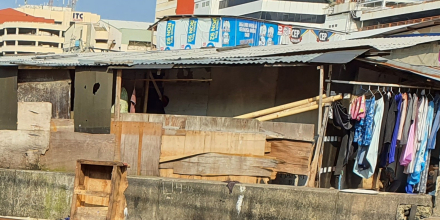Examining sanitation provision in Jakarta’s kampungs: Access, risk, and right to the city

Event details
PhD Seminar
Date & time
Venue
Speaker
Contacts
This presentation examines the provision of urban sanitation in Jakarta’s kampungs (informal urban settlements), a context where sharp disparities in basic sanitation services persist. While access to sanitation has been acknowledged as a universal human right, it has various practical meanings to various communities. Processes of marginalisation in urban kampungs shapes who gets access to safe sanitation and how, and who gets excluded and how. Through a grounded methodology focusing on everyday social practices and attention to the material and political realities of life in informal settlement communities, the thesis assembles an urban political ecology of sanitation in Jakarta. The study adopts a mixed methods approach, including ethnographic participant-observation and semi-structured interviews with key informants, supported through quantitative survey data and descriptive statistics, for capturing the complexity of sanitation provision and the lived experience of local residents. My approach examines the discrepancies of access and perceptions risk by different households and neighbourhoods, and foregrounds the how social, political and material relations shape the right to the city.
The thesis argues that the kampungs as informal settlements in Jakarta are produced as spaces of urban marginalisation, which has historically been created and reproduced in contemporary life, impacting on unequal access to safe sanitation. Throughout the three empirical chapters of the thesis, the approach to an urban political ecology of sanitation in this thesis is organised through concepts of access, risk, and rights to the city. The first conceptualisation of access argues that that inequality in sanitation access is asserted through asymmetrical power relations for securing access and control over the service, which is shaped by access to a toilet and wastewater disposal infrastructure, home ownership status, as well as the adoption of a range of alternative sanitation practices that vary widely between different household and settlements. For the concept of risk, the thesis looks on how unequal risks are produced through uneven development by extending current understanding on how water and sanitation are risk perceived, prioritised, and managed by people in Jakarta’s kampungs. The third conceptualisation of right to the city relates to social struggles around sanitation and how individuals and communities, marginalised by a host of factors, including economic, social, and place-based issues, identifies strategies of negotiating access to sanitation and claim their right to the city. While there are some individuals and groups engaging in different strategies including collective social mobilisation strategies, nevertheless, on the whole such movements have not been effective to date in securing access to safe sanitation for urban kampung residents.
With increasing urbanisation and the changing urban ecology, access to safe sanitation in Jakarta’s kampungs will only become a more pressing issue. Thus, providing adequate, safe, affordable, and accessible sanitation for all users in informal settlements requires understanding the grounded realities of access to sanitation by considering actual capacities and practices as well as increasing education and empowerment among residents. In this context, improved access to basic services is a rallying point for reducing inequalities among the population so disadvantaged groups in urban Jakarta can enjoy their right to the city.
Vita Elysia is a PhD candidate in the Resources, Environment and Development (RE&D) program at the Crawford School of Public Policy. Her research focuses on the urban pollical ecology of sanitation in Indonesia. In particular, she is interested in water and sanitation policy in developing countries and how some related issues such as the pro-poor approach, gender mainstreaming, and equity in access shape water and sanitation policy and management. She received a Bachelor of Urban and Regional Planning from Universitas Gadjah Mada (UGM), Indonesia and a Master of Urban Management and Development from IHS Erasmus Universiteit Rotterdam (EUR), The Netherlands.
Supervisory panel members: Keith Barney, Arianto Patunru, Michelle Kooy
Updated: 18 July 2024/Responsible Officer: Crawford Engagement/Page Contact: CAP Web Team











